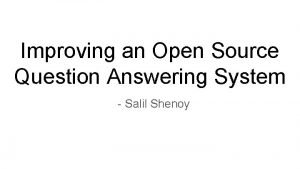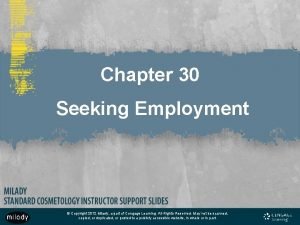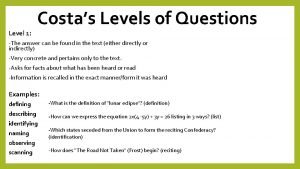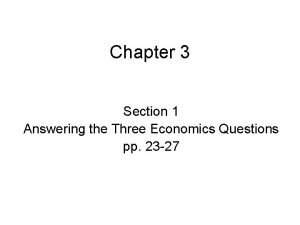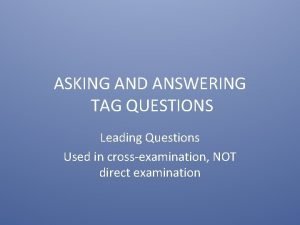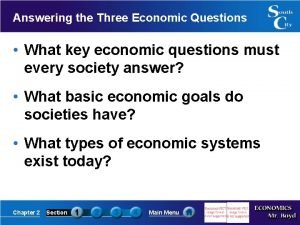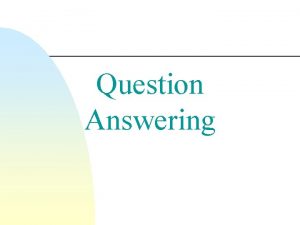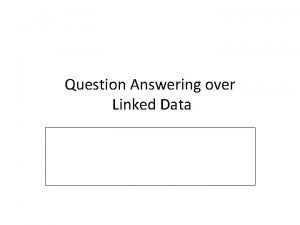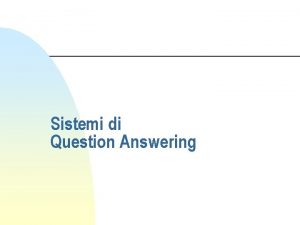Media Regulation Answering Questions Answering An InfluenceRegulation Question








- Slides: 8

Media Regulation Answering Questions

Answering An Influence/Regulation Question • Don’t just define/outline theory/method of regulation – the assessor is looking for your application of it, not your ability to memorise definitions. (rote learning is bad, mmmkay).

Answering An Influence/Regulation Question • ANY discussion of a theory or model or form of regulation should include reference to evidence (a real-world case or experiment with supporting STATISTICS). • Remember that the whole point of this topic is to demonstrate your analytical understanding of how the media influences its audience. So, even if a question says “describe”, you should still be writing in an analytical way with supporting evidence.

Media Regulation Exam Questions: 2015 • Why is regulation of the media challenging and often debated? In your response, you must include: • arguments surrounding the rationale for and regulation of the media • evidence about media influence on audiences and the broader society. • (8 marks)

Media Regulation Exam Questions: 2014 • The media is subject to regulation that may define standards, set limitations or place ethical parameters on it. a. Explain a form of media regulation. (2 marks) • b. Discuss two arguments in favour of this type of media regulation. (4 marks)

Media Regulation Exam Questions: 2013 • Read this article - http: //tinyurl. com/mediaregulation • Discuss the issues raised about media regulation in this extract. In your response, refer to the rationale for and arguments about the regulation of the media in Australia. • Glossary: • 1. trails – falls or remains behind • 2. media silos – media that work independently of each other • 3. blind – unaware of

Media Regulation Exam Questions: 2012 • The regulation of the media is a constant subject of social and political debate. • a. What are the major forms of media regulation in Australia? (2 marks) • b. Outline two of the major arguments and evidence for media regulation. (4 marks) • c. Analyse an issue arising from the attempt to regulate the media in a modern, democratic society such as Australia. (3 marks)

Sample Response 5. Describe two organizations that regulate the media in Australia In Australia, the Australian Classifications Board (ACB) is a government body that regulates the media through classifications of film, TV, games and publications. This board reviews media and gives it a classification based on a number of principles, including the idea that adults should be able to “read, hear and see what they want”, and children should be protected from material that might upset or disturb them. The ACB, under the National Classification Scheme, will then give the media text a rating, such as MA 15+ or R 18+, ensuring that under the law, only a certain age of people can view the text. The ACB may also refuse classification, thereby prohibiting the sale or hire of the media text in Australia. Another organization that regulates the media is the Advertising Standards Bureau, which is a self-regulating body for advertisement in Australia. This organization takes free consumer complaints regarding advertising they’ve seen, under issues that might include: discrimination, violence or health and safety. The Bureau then reviews the advertisement and upholds or dismisses the complaint based on their codes that govern advertising content. However, this organization is said to be ‘toothless’ and have no real power, as their codes aren’t binding and complaints can be dismissed by the advertiser.
 Open source question answering system
Open source question answering system A place where you may obtain employment milady
A place where you may obtain employment milady Level 2 costa questions
Level 2 costa questions Present simple v present continuous
Present simple v present continuous Economics chapter 3 section 1 answer key
Economics chapter 3 section 1 answer key Answering questions in spanish
Answering questions in spanish Chapter 2 section 1 answering the three economic questions
Chapter 2 section 1 answering the three economic questions Answering tag questions
Answering tag questions Chapter 2 section 1 answering the three economic questions
Chapter 2 section 1 answering the three economic questions
